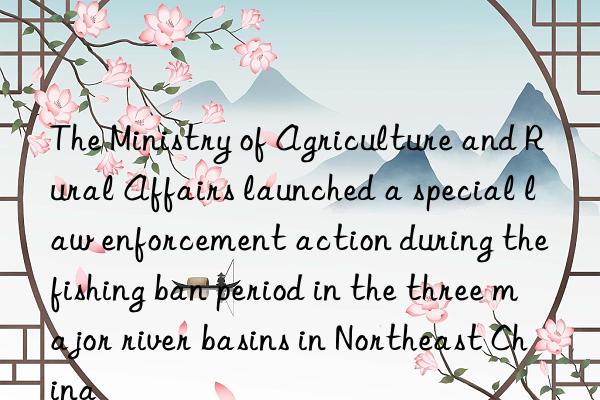
According to the website of the Ministry of Agriculture and Rural Affairs, at 12 o'clock on May 16, my country's Haihe River, Liaohe River, and Songhua River Basin (hereinafter referred to as "the three major river basins in Northeast China") opened a two-and-a-half-month fishing ban, which marks the beginning of a two-and-a-half-month fishing ban in my country this year. The four major sea areas and the seven key inland river basins have fully entered the fishing moratorium period. On the same day, the Ministry of Agriculture and Rural Affairs held the "China Fishery Policy Bright Sword 2023" special law enforcement action on fishing bans in the three major river basins in Northeast China in Songyuan City, Jilin Province, to further strengthen the deployment of fishing ban law enforcement and expand the social impact of the fishing ban period system.
The Ministry of Agriculture and Rural Affairs pointed out that the closed fishing season system is an important fishery resource conservation system established in accordance with the Fisheries Law. Since the implementation of the unified fishing ban system in the three major river basins in Northeast China in 2019, the Ministry of Agriculture and Rural Affairs has listed the law enforcement supervision of the three major river basins during the fishing ban period as a key task of the "China Fishery Policy Sword" series of special law enforcement actions every year, with strong law enforcement guarantee System implementation. This year's No. 1 Central Document clearly stated that the system of fishing moratoriums should be strictly implemented. Fishery and fishery administration departments at all levels and fishery law enforcement agencies should raise their political positions, effectively shoulder their responsibilities, maintain a high-pressure and crackdown situation, and solidly carry out special law enforcement on fishing bans. Take action to ensure that the system is properly implemented and resource conservation is in place.
The Ministry of Agriculture and Rural Affairs requires that fishery and fishery administration departments at all levels and fishery law enforcement agencies should be brave enough to take responsibility and act, effectively implement the supervision of fishing ban law enforcement, promote the green and high-quality development of fishery and build an ecological civilization in water areas. It is necessary to actively seek the support of local party committees and governments, strengthen law enforcement forces, improve the law enforcement joint logistics linkage mechanism, deepen inter-regional law enforcement cooperation and cooperation, and improve law enforcement efficiency. It is necessary to keep an eye on key time periods, key water areas, and key objects, carry out targeted special law enforcement actions, and crack down heavily on various fishing-related illegal and criminal activities such as fishing-related "three noes" ships and electronically poisoned fish bombings. It is necessary to widely popularize legal knowledge and the fishing ban system, do a good job in exposing typical problems and major cases, improve the effect of group prevention and treatment, and create a good social atmosphere.
It is understood that in 2022, the fishery and fishery administrative departments and fishery law enforcement agencies of 10 provinces (autonomous regions and municipalities) in the Haihe River, Liaohe River, and Songhua River Basin will solidly carry out special law enforcement actions during the fishing ban period of the three major river basins, and dispatch law enforcement personnel 135,000 trips, 45,000 vehicles and boats, 21,000 inspections of fishing boats, fishing ports, and natural stops, 1,163 cases of violations of laws and regulations, 163 cases transferred to judicial processing, and 284 persons transferred to judicial processing , Cleared and banned 3,420 fishing-related "three noes" ships, and 119,000 "extreme household nets" (top).



 微信扫一扫打赏
微信扫一扫打赏
